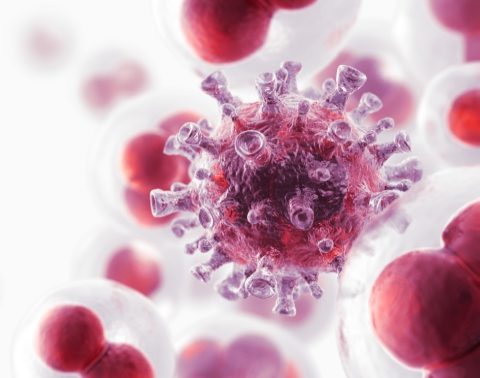
Personalized, cancer-specific networks

Description
- Programme: DFG-DACH (Germany, Austria, Switzerland): German Research Foundation(DFG) in association with the Austrian Science Fund(FWF) in Austria and the Swiss National Science Foundation (SNSF)
- Funding amount: €1.11 million, of which €556,000 is allocated to Bavaria
- Funding period: 07/2017–06/2020
- Coordinator: Professor Dr. Dmitrij Frishman, Technical University of Munich
- Project number: 326946590
Personalized, cancer-specific networks: Each cancer is different
Proteins play an important role in every cell: They control almost all vital processes in the body. Cancer-related gene mutations can change proteins and affect protein interactions. As a result: A given medication does not provide the same benefit to every cancer patient. A personalized treatment strategy is therefore the long-term goal of the "Personalized Cancer-specific Networks" project funded by DFG-DACH.
For some cancer patients, many standard medications fail in the same way. This is caused by mutations in the genetic material, which change amino acids, the building blocks of proteins. As a consequence, the resulting proteins can deviate so starkly from standard that this may disturb an interaction between usual interaction partners. In this way, medication normally modeled on the respective interaction partner in order to affect a protein interaction will become less effective or even ineffective. This makes it all the more important for physicians to test in advance whether a specific medication will be effective or not for a certain patient.
As part of the "Personalized Cancer-specific Networks" project, the Technical University of Munich, the Innsbruck Medical University, and ETH Zurich are working on the common goal of creating individual cancer prognoses using a systematic approach. Because the individual genetic material regulates how proteins function, it is essential to identify individual differences and use these for the therapy. Mutations in the genetic material, the resulting protein characteristics, and the respective disease symptoms (cancer) should therefore be considered together. This creates causal relationships that make it possible to develop a therapy approach tailored to the patient. In concrete terms, protein mutations are analyzed using bioinformatic methods, which allows the interactions of patient-specific protein variations to be simulated with a computer. The goal here is to identify those mutations that have an effect with the patient's variant, i.e. to create a clinical picture (candidate model). Researchers obtain information from the patient's genetic material and existing proteins to work out such candidate models. The respective models are then compared and validated experimentally using synthesized protein complexes and patient samples.
Comment on BayFOR’s contribution:

"I have worked closely with BayFOR for many years. BayFOR employees always provide committed and expert support with the application process. In this case, they gave us valuable application-related information as well as critical comments on the application text."
Professor Dr. Dmitrij Frishman
Technical University of Munich
Chair of Genome-Oriented Bioinformatics
Phone: +49 (0)8161 712134
Email: d.frishman@no-spam-pleasewzw.tum.de




